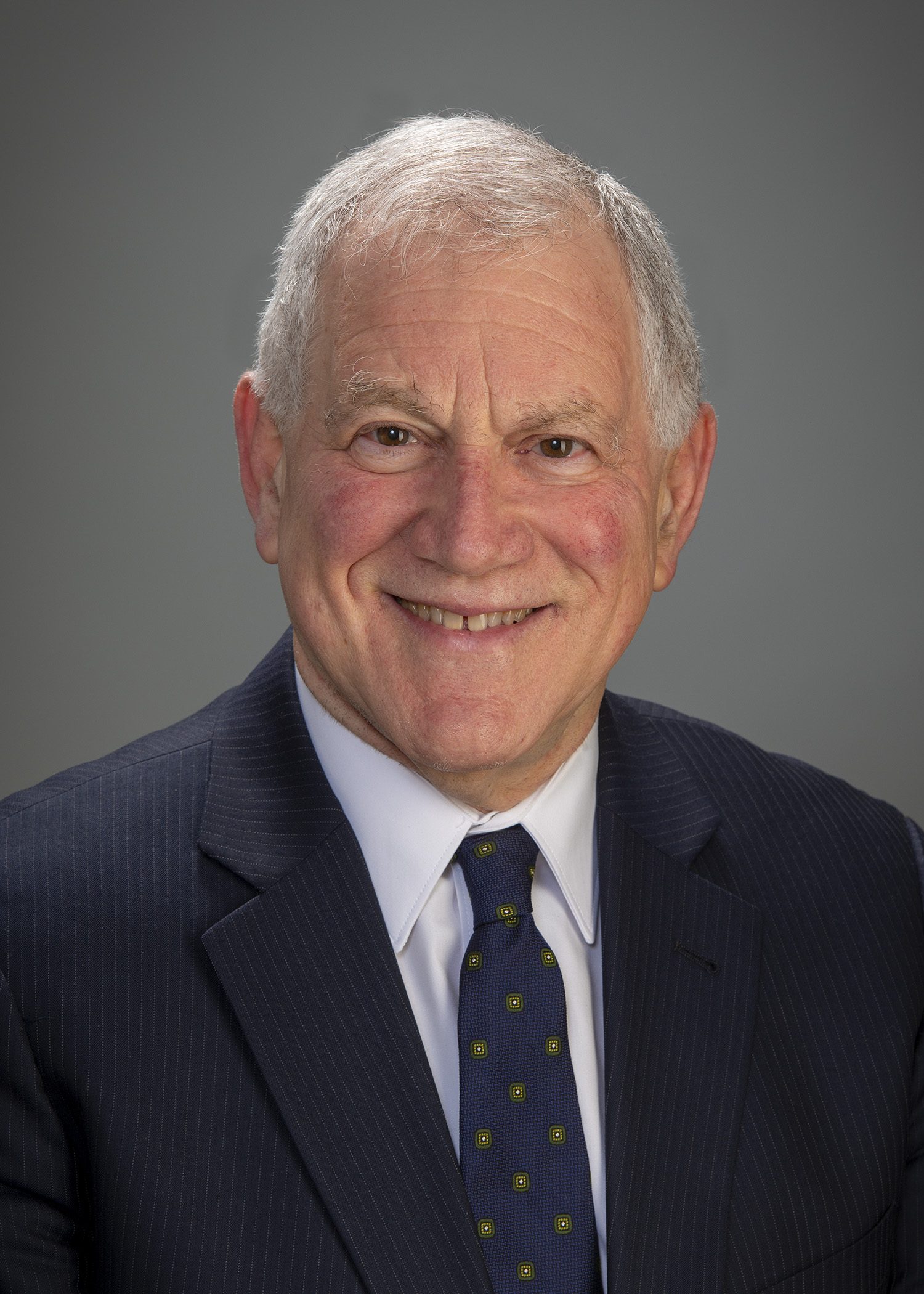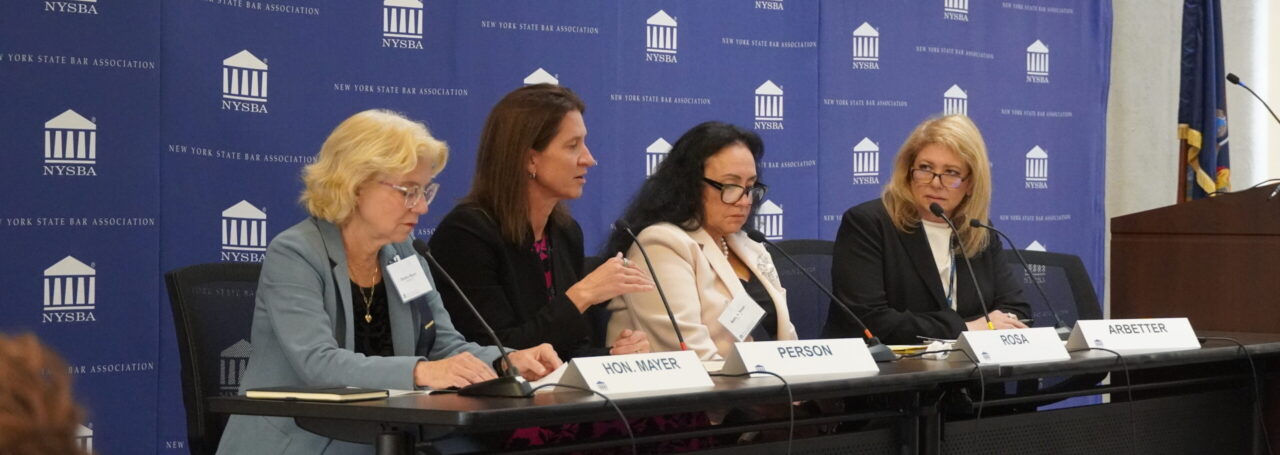President’s Report: Richard Lewis Discusses Alleviating Barriers To Expand Access to Legal Representation
6.10.2023

Dear Colleagues:
It is so wonderful to be in this beautiful village on Lake Otsego in Cooperstown, about eighty miles north of Binghamton where I was born and raised and have spent most of my life. This rural setting resonates with me.
Standing here before you as your one-hundred and twenty-sixth president is the highest honor of my professional career. It is the culmination of all my work for the New York State Bar Association and for my local bar association. My presidency of the Broome County Bar Association. My time chairing the Uniform Rules Committee of the New York State Bar Association. My stint leading the NYSBA Task Force on Notarization. All these positions have prepared me for today.
Presiding Justice Garry, it was a distinct honor to have you swear me in and I look forward to working closely with you over the next year.
I ask all of you to take a moment to acknowledge my predecessor, Sherry Levin Wallach, for her outstanding leadership, guidance, and many accomplishments during the past 12 months. I also want to acknowledge all of the past presidents who have advised and encouraged me.
Looking ahead to the next year and beyond, I want to introduce the Association’s incoming leadership team. President-Elect Domenick Napoletano, Secretary Taa Grays, Treasurer Susan Harper and, of course, Sherry Levin Wallach, who has now become our Immediate Past President.
I also want to thank my family for their patience and support, and the association’s staff who continue to do outstanding work.
I view the next 12 months as an opportunity for the Association to tackle issues that are important to us individually as attorneys, and for the profession as a whole. Most of them do not have easy solutions, which is why we need to tackle them head on.
I don’t have all the answers, which is why I need all of you. I promise that my door – at least virtually – will always be open. I want to hear from you — whether you are practicing in Manhattan or Malone. The strength and success of our Association rests on your participation. Your time, expertise, and input are invaluable.
The overarching theme of my presidency will be Standing up for the Practice of Law.
The primary objective is to provide our members with the resources and support they require to perform their jobs in the most productive manner possible. Here again, I need your input. We want to hear about impediments and redundancies and inefficiencies and anything else that stands in the way of your ability to serve your clients and maximize their effective representation.
The future of our profession and our ability to confront issues are dependent upon the willingness and ability of attorneys to step forward when we believe our vocation – or the rule of law – is under attack. We also need to listen to each other and respect differences of opinion. We may not always agree, but we can increase our influence through a constructive and civil dialogue.RepresentationH
We face enormous issues as a profession and as a society – from hate crimes to homelessness and everything in between. Our ability to move forward iRepresentationn addressing these challenges is largely dependent on our ability to listen to one another, even if we disagree – perhaps especially if we disagree.
To begin that discourse, I am launching three task forces: Homelessness and the Law, Medical Aid in Dying, and Anti-Semitic and Anti-Asian Hate. The task force on Anti-Semitic and Anti-Asian Hate is responding to a significant increase in hate crimes targeting Asians and Jews in New York and the nation.
As far as homelessness goes, we all see it every day, whether on the news or walking through our hometowns. I know most of us in this room have at one time or another averted our eyes, but we need to do the opposite – we need to see the problem more clearly. By working to ease homelessness, we will be addressing other problems that are related to it such as domestic violence, alcoholism, mental illness, drug addiction, and the difficulties our veterans face.
One of the biggest assets we have at the New York State Bar Association is our diversity. Our diverse thoughts, our diverse backgrounds, our diverse political views. That’s what makes us effective. And that’s why we have the ability to represent everyone – from the solo practitioner to Big Law.
We have access, too, to bring issues before decision makers at the state and federal level – whether it be the executive, legislative or judicial branches. We are the most powerful attorney lobbying group in the state and as you know, the largest voluntary state bar association in the country.
To be clear, while it’s important to acknowledge that we can always do better, we also do a lot of things right.
For example, we make it easier for attorneys to practice law by offering almost 500 new CLE’s per year and providing our members 24/7 access to over 1,500 courses on-demand. We have fought the new notarization requirements, helped indigent people gain access to justice and succeeded in having the court system modify illogical rules.
One of the things I quickly learned during my law school days in Chicago and in my early days as a general practitioner is that being a lawyer is hard work, and there is no reason to make it any harder. It’s like playing hockey. Skating around in circles might look like progress, but it makes no sense when the goal is right in front of you.
The same goes for practicing law, we need to stop skating in proverbial circles. We can start by improving our professional efficiency. Only about thirty-three percent of our time is spent on billable hours, according to the 2022 Clio Legal Trends Report, which, believe it or not, is actually an improvement from the previous year, but clearly still not optimal.
We need a more efficient court system that operates in a way that is best for the bar, the bench, and all litigants. We can’t do that without better broadband access, easier to use e-filing systems and training for court employees on the secure use of mobile devices, protected case management and data management platforms, and, most of all, frank and frequent communication.
To that end, I have established the Committee on Law Practice and Court Rules to address inefficiencies and procedural impediments that impact lawyers. The committee’s mission will be to identify and evaluate barriers, to monitor proposed amendments to court rules, and ultimately make recommendations to our Executive Committee.
Even in the most efficient system, there cannot be access to justice if individuals lack representation. In the rural areas of this state, there are simply not enough attorneys to meet a growing need for their services.
Civic education is critical to the long-term success of our organization, our state, and our nation. We need to educate our children and the public about the power and importance of “small-d” democracy. We as a bar association and in collaboration with other bar associations should highlight the importance of informing the next generation of voters that the best way to maintain the rule of law is to better understand it. Our democracy depends on it.
We can and we will make a more sustainable profession for the next generation. Educating our children about the legal system can incentivize social change and remove the cynicism that has caused many of them to lose faith in the very institutions designed to protect them. However, we cannot expect them to actively participate and make their voices heard if they do not understand how the systems work.
We have a duty to mentor the next generation and help them reach their incredible potential. That is why we are planning on holding a civics symposium next May.
The work I have done with the Association is what has inspired me and continues to motivate me to do even more.
Rest assured; I understand the breadth of my agenda. My aim this year is to bring forth our concerns to the governor, the Legislature, and the Office of Court Administration so we can remove barriers interfering with the practice of law, protect vulnerable New Yorkers, and improve access to justice across the state.
I would like to leave you with this thought. I would not be here today if not for the dedication and leadership of the one-hundred and twenty-five presidents of this organization who have come before me. They are all role models who have set high standards. I am humbled to be included in this group of venerable leaders and am honored that you have entrusted me to be in their company. I assure you I will strive every day to live up to the lofty standards they have set for this organization and for the rule of law.
Thank you.






